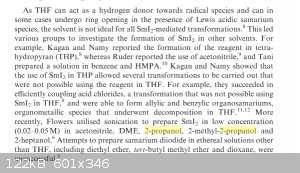DraconicAcid
International Hazard
    
Posts: 4355
Registered: 1-2-2013
Location: The tiniest college campus ever....
Member Is Offline
Mood: Semi-victorious.
|
|
Lanthanides?
So I'm looking at lanthanides on AliExpress. Some of them are surprisingly cheap.
Holmium- 20 g for $30.
Ytterbium- 20 g for $24
Samarium- 100g for $24
Erbium- 20 g for $30
Gadolinium- 50g for $40.
Dysprosium 10g for $30.
Any of these do particularly interesting chemistry? I'm mostly into coordination chemistry.
Please remember: "Filtrate" is not a verb.
Write up your lab reports the way your instructor wants them, not the way your ex-instructor wants them.
|
|
|
Bedlasky
International Hazard
    
Posts: 1241
Registered: 15-4-2019
Location: Period 5, group 6
Member Is Offline
Mood: Volatile
|
|
Samarium and ytterbium have interesting chemistry in divalent state. SmI2 and YbI2 can be made from metal and iodine in THF. Both are used in several
organic reductions. Sm(II) is more reactive than Yb(II) due to less stable configuration.
https://sci-hub.se/https://pubs.acs.org/doi/10.1021/ja00528a...
https://en.wikipedia.org/wiki/Reductions_with_samarium(II)_i...
https://books.google.cz/books?id=QUfQamGsEgwC&printsec=f...
Eu(II) is stable even in aqueous solution. It can photochemicaly reduce water to hydrogen. But europium is expensive.
Lanthanides in III oxidation state have very similar chemistry. You can try complexes in different acids like HClO4, HNO3, H2SO4, HCl, HBr etc. Each
solution should have different shade of colour, I tried this with neodymium. Gadolinium(III) forms colourless solutions, so not much spectacular
aqueous chemistry. However metallic gadolinium is ferromagnetic below 20°C.
Cerium, praseodymium and terbium have interesting chemistry in IV oxidation state. Ce(IV) have very rich chemistry, Pr(IV) and Tb(IV) not so much,
they form periodate, tellurate and polytungstate complexes in aqueous solution. Terbium is expensive, but cerium and praseodymium can be obtained
quite cheap.
|
|
|
nezza
Hazard to Others
  
Posts: 324
Registered: 17-4-2011
Location: UK
Member Is Offline
Mood: phosphorescent
|
|
Gadolinium has some interesting magnetic properties. At room temperature it is strongly paramegnic (weakly attracted to a magnet), but below 20 deg C
it becomes ferromagnetic and is strongly attracted to magnets. Erbium anf Holmium salts have interesting colour changes under different lighting
conditions (Fluorescent vs daylight).
[Edited on 3-12-2021 by nezza]
If you're not part of the solution, you're part of the precipitate.
|
|
|
DraconicAcid
International Hazard
    
Posts: 4355
Registered: 1-2-2013
Location: The tiniest college campus ever....
Member Is Offline
Mood: Semi-victorious.
|
|
Well, I went for the samarium. Now to see if I ever get around to doing anything with it.
Please remember: "Filtrate" is not a verb.
Write up your lab reports the way your instructor wants them, not the way your ex-instructor wants them.
|
|
|
Fery
International Hazard
    
Posts: 1026
Registered: 27-8-2019
Location: Czechoslovakia
Member Is Offline
|
|
DraconicAcid - Sm metal dissolves easily in acids into Sm(III) salts. If you would like Sm(II) you can react Sm + CH2I2. You can obtain diiodomethane
by Finkelstein reaction from dichloromethane + NaI in acetone environment.
I do not know how much pure lanthanides are sold in AliExpress. I used to buy lanthanides always from onyxmet.pl and chemcraft.su
[Edited on 4-12-2021 by Fery]
|
|
|
DraconicAcid
International Hazard
    
Posts: 4355
Registered: 1-2-2013
Location: The tiniest college campus ever....
Member Is Offline
Mood: Semi-victorious.
|
|
Thanks- I might have to try that (I've also found a prep for SmI2 using iodine and THF, but I don't have the latter ether- just diethyl. I may be
getting some glyme later on, but not sure if that will work).
Please remember: "Filtrate" is not a verb.
Write up your lab reports the way your instructor wants them, not the way your ex-instructor wants them.
|
|
|
Bedlasky
International Hazard
    
Posts: 1241
Registered: 15-4-2019
Location: Period 5, group 6
Member Is Offline
Mood: Volatile
|
|
I think that glyme should work. Book which I mentioned above mention SmI2 complexes with diglyme and diethyleneglycol. It also mention preparation in
different solvents than THF, including such a common solvents like acetonitrile, isopropyl alcohol or tert-butyl alcohol.

[Edited on 4-12-2021 by Bedlasky]
|
|
|
DraconicAcid
International Hazard
    
Posts: 4355
Registered: 1-2-2013
Location: The tiniest college campus ever....
Member Is Offline
Mood: Semi-victorious.
|
|
Quote: Originally posted by nezza  | Erbium and Holmium salts have interesting colour changes under different lighting conditions (Fluorescent vs daylight).
|
Can confirm. I made some very pretty little crystals of erbium(III) sulphate hexahydrate which are a gorgeous pink under the lab lights, but dingy
orange-pink in the hallway. Amazing difference.
Please remember: "Filtrate" is not a verb.
Write up your lab reports the way your instructor wants them, not the way your ex-instructor wants them.
|
|
|